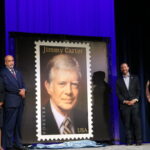ATLANTA — Georgia lawmakers who say they want to address doubts about election security wrapped up a fifth marathon meeting Thursday, hearing about themes repeated from prior such events during their travels across the state.
Some Republicans on the GOP-led study committee expressed skepticism about the security of a multi-state compact created to detect illegal voting. And the lone Democrat questioned the credibility of speakers the Republicans had invited to give evidence.
The hearing, which spanned nearly five hours, featured a half dozen election officials, experts and advocates.
Nearly all of them got at least half an hour to present, before more than two dozen members of the public, some of them local election officials who had driven from far-flung counties, got 90 seconds apiece.
An exchange between Rep. Saira Draper, D-Atlanta, and Erik Christensen, an accountant called to testify about how Georgia’s election audit procedures are “a rubber stamp recount,” might have summed up the core of the years-long fight over voting that flared after Donald Trump’s 2020 loss to Joe Biden.
Christensen acknowledged that he had never managed an election or even worked a poll, leading Draper to ask why someone with his qualifications was “sitting here today talking to us about your opinions.”
She threw in a “with all due respect,” but her line of attack was clearly aimed at his credibility — and by extension the motivations of the Republicans who invited him to speak.
Christensen responded that he knows “how to account for things.”
“But,” said Draper, “you’ve never had a client in election administration.”
“It doesn’t matter,” Christensen shot back. “Numbers are numbers are numbers. In fact, I can’t think of anything on the surface easier than counting votes.”
Then, he added, “Have we turned it into a can of worms? Oh yes.”
That about sums up the situation facing the committee, which will likely promote more election-related legislation next year. That would come after a series of new voting laws in recent years that have not quelled doubts.
The testimony, some of it repeated from prior hearings, went deep into the details of data security, voter roll maintenance, election audits, voter confidence surveys, conflicts of interest, and the history of partisan pivots on election security based on who won and lost.
Republicans pointed to doubting Democrats when Stacey Abrams was defeated by Gov. Brian Kemp in their first gubernatorial matchup, when Kemp, as Secretary of State, oversaw their contest.
Republicans had sharp questions for Shane Hamlin, executive director of the Electronic Registration Information Center, or ERIC, a multistate consortium.
The organization has been collecting and comparing voter data for over a decade, with the goal of detecting people who vote in more than one state.
Hamlin described his nonprofit as bipartisan, and he confronted suspicions that it is, as he put it, a “shadowy” operation.
Georgia lawmakers have been talking about abandoning ERIC since nine states, nearly all of them Republican-dominated, left in 2023. Draper called it a “rash reaction” to Donald Trump’s 2020 presidential loss to Joe Biden, but two Republicans on the committee criticized the organization’s data security and the fact that most of its meetings are in private.
Georgia and other states send ERIC the personal information of voters, including their dates of birth and their Social Security Numbers.
Hamlin said the data is secured by irreversible encryption and by strict protocols for accessing it. He only has two staffers with the credentials and equipment to pull data from a hosting site somewhere in the Midwest, a location he wouldn’t disclose for security reasons.
Rep. Martin Momtahan, R-Dallas, said the login procedure sounded no more secure than the way he accesses his Gmail.
“It’s not exactly the same,” Hamlin responded.
Rep. Trey Kelley, R-Cedartown, criticized ERIC for holding only one public meeting per year, convening privately the rest of the time. Hamlin responded that ERIC is not subject to open meeting law but does disclose meeting information on its website.
One election watchdog who testified about “systemic irregularities” in voting felt compelled to address the heated politics head on. Mark Davis, president of Data Productions, Inc, introduced himself as someone who is “not an election denier” and is “just trying to solve a problem.”
The people who got 90 seconds apiece at the end mostly expressed confidence in election outcomes, but some expressed suspicions that may prove difficult to dislodge, absent a reversion back to hand-marked and hand-counted voting on paper.
No one can lay eyes on a voter’s intent when it is translated into an “unverifiable” electronic ballot through a proprietary system like the one used in Georgia, said one woman. “And there is no way to squeeze trust out of that.”



